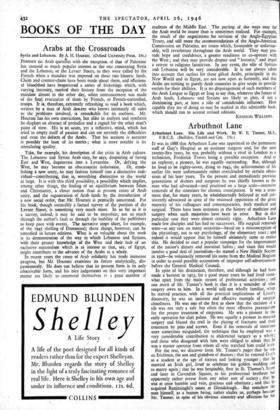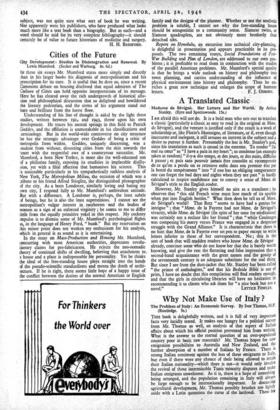Arbuthnot Lane
Arbuthnot Lane. His Life and Work. By W. E. Tanner, M.S., F.R.C.S. (Bailliere, Tindall and Cox. 15s.) IT was in 1888 that Arbuthnot Lane was appointed to the permanent staff of Guy's Hospital as an assistant surgeon and, for the next twenty-five years, he was probably without a rival in London as a technician, Frederick Treves being a possible exception. And as an explorer, a pioneer, he was equally outstanding. But, although he lived to be eighty-seven, dying in 1943, the achievements of his earlier life were unfortunately rather overclouded by certain obses- sions of his later years. To the present and immediately previous generations of doctors and surgeons he was chiefly known as the man who had advocated—and practised on a large scale—extensive removals of the intestines for chronic constipation. It was a treat- ment that, for many years, he wholeheartedly believed in and per- sistently advocated in spite of the reasoned opposition of the .great majority of his colleagues and contemporaries, both medical and surgical. There have been instances in the history of medicine and surgery when such majorities have been in error. But in this particular case they were almost certainly right. Arbuthnot Lane made few disciples and has had no successors. His surgical removals were—at any rate on many occasions—based on a misconception of the physiology, not to say psychology, of the alimentary tract ; and indeed it would appear that he himself ultimately came to realise this. He decided to start a popular campaign for the improvement of the nation's dietary and intestinal habits ; and since this would involve a good deal of journalism—he started a New Health Society in 1926—he voluntarily removed his name from the Medical Register in order to avoid possible accusations of improper self-advertisement before the General Medical Council.
In spite of his distinction, therefore, and although he had been made a baronet in 1913, for a good many years he had lived some- what apart from the main stream of professional activities ; and one merit of Mr. Tanner's book is that it is a reminder of what surgery owes to him. In a world still not wholly familiar, when he started practice, with all the practical implications of Lister's discovery, he was an insistent and effective example of surgical cleanliness. He was one of the first to show that the excision of a rib was not only a safe but often the most effective prerequisite for the proper treatment of empyema. He was a pioneer in the early operation for cleft palate. He was equally a pioneer in mastoid surgery and blazed the trail in the plating of fractures and their treatment by pins and screws. Even if his removals of intestines were sometimes misguided, the technique that he employed was 3 very considerable contribution to abdominal surgery as a whole ; and those who disagreed with him were obliged to admit that he was a master operator from whom all who watched him could learn.
For the rest, we discover from Mr. Tanner's pages that he was an Irishman, the son and grandson of doctors ; that he entered Guy s as a student at the age of sixteen and looking younger ; that he married an Irish girl, lived to celebrate his golden wedding and to marry again ; that he was hospitable, first in St. Thomas's Steed and later in Cavendish Square, to his professional brethren but apparently rather averse from any other sort of society ; that he was at once humble and vain, gracious and obstinate ;.and that he acquired Ranjitsinghi's estate at Glendalough. But somehow the man himself, as a human being, rather eludes us, perhaps because Mr. Tanner, in spite of his obvious sincerity and affection for his
subject, was not quite sure what sort of book he was writing. Nor apparently were his publishers, who have produced what looks much more like a text book than a biography. But as such—and a word should be said for its very complete bibliography—it should certainly be of value to future historians of medicine and surgery.
H. H. BASHFORD.



























 Previous page
Previous page